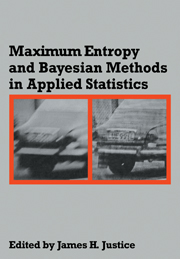 Maximum Entropy and Bayesian Methods in Applied Statistics
Maximum Entropy and Bayesian Methods in Applied Statistics Book contents
- Frontmatter
- Contents
- Preface
- Donors
- Bayesian Methods: General Background
- Monkeys, Kangaroos, and N
- The Theory and Practice of the Maximum Entropy Formalism
- Bayesian Non-Parametric Statistics
- Generalized Entropies and the Maximum Entropy Principle
- The Probability of a Probability
- Prior Probabilities Revisited
- Band Extensions, Maximum Entropy and the Permanence Principle
- Theory of Maximum Entropy Image Reconstruction
- The Cambridge Maximum Entropy Algorithm
- Maximum Entropy and the Moments Problem: Spectroscopic Applications
- Maximum-Entropy Spectrum from a Non-Extendable Autocorrelation Function
- Multichannel Maximum Entropy Spectral Analysis Using Least Squares Modelling
- Multichannel Relative-Entropy Spectrum Analysis
- Maximum Entropy and the Earth's Density
- Entropy and Some Inverse Problems in Exploration Seismology
- Principle of Maximum Entropy and Inverse Scattering Problems
- Index
Principle of Maximum Entropy and Inverse Scattering Problems
Published online by Cambridge University Press: 04 May 2010
- Frontmatter
- Contents
- Preface
- Donors
- Bayesian Methods: General Background
- Monkeys, Kangaroos, and N
- The Theory and Practice of the Maximum Entropy Formalism
- Bayesian Non-Parametric Statistics
- Generalized Entropies and the Maximum Entropy Principle
- The Probability of a Probability
- Prior Probabilities Revisited
- Band Extensions, Maximum Entropy and the Permanence Principle
- Theory of Maximum Entropy Image Reconstruction
- The Cambridge Maximum Entropy Algorithm
- Maximum Entropy and the Moments Problem: Spectroscopic Applications
- Maximum-Entropy Spectrum from a Non-Extendable Autocorrelation Function
- Multichannel Maximum Entropy Spectral Analysis Using Least Squares Modelling
- Multichannel Relative-Entropy Spectrum Analysis
- Maximum Entropy and the Earth's Density
- Entropy and Some Inverse Problems in Exploration Seismology
- Principle of Maximum Entropy and Inverse Scattering Problems
- Index
Summary
ABSTRACT
Using the principle of maximum entropy, a procedure is outlined to study some aspects of the inverse scattering problem. As an application we study a) the quantum mechanical inverse scattering problem using the Born Approximation, b) the electromagnetic inverse problem, and c) the solutions to the Marchenko equation of inverse scattering.
INTRODUCTION
Following the pioneering work by Jaynes [1], concerning the information theoretic approach to statistical mechanics, there have been several novel applications of the principle of maximum entropy in a number of areas such as image processing, and geophysical data analysis [2]. Of particular importance to the present work is a paper by Jaynes on time series analysis using the principle of maximum entropy in which Jaynes [3] derived Burg's [4] spectral method. The main goal of this paper is to demonstrate the applicability of the maximum entropy method for analyzing the generalized inverse problem. In Section 2 we develop the formulation for tackling generalized inverse problems suitable for the case when the available information is either incomplete or noisy. The efficacy of the formulation of Section 2 is demonstrated in Section 3 by studying its application to the inverse problem in quantum mechanical scattering theory. We present two more examples in Sections 4 and 5 where we present a solution to the inverse problem associated with the Marchenko integral equation of scattering theory and the electromagnetic inverse problem. Finally, in Section 6 we make some concluding remarks.
Information
- Type
- Chapter
- Information
- Maximum Entropy and Bayesian Methods in Applied StatisticsProceedings of the Fourth Maximum Entropy Workshop University of Calgary, 1984, pp. 300 - 316Publisher: Cambridge University PressPrint publication year: 1986
Accessibility standard: Unknown
Why this information is here
This section outlines the accessibility features of this content - including support for screen readers, full keyboard navigation and high-contrast display options. This may not be relevant for you.Accessibility Information
- 1
- Cited by